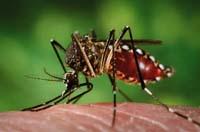The genome of the mosquito transmitter dengue to examination

The genomes of two famous mosquitoes have already been decoded in the genetics laboratories. The first was the genome of the Anopheles gambiae mosquito, which transmits malaria in 2002. The second, that of Aedes aegypti, a mosquito that spreads Denge’s disease, has not been completely decoded, but they have just presented their “first draft” of code in the Virginia Tech organization, with 80% of the genes expected by scientists.
The two mosquitoes infect a microbe by clicking (the malaria protozoo and the malaria virus), but this does not mean they are similar. They are very different, they have the greatest possible difference between two mosquitoes. In evolution, they were distributed 150 million years ago and have traveled very different paths. The one that transmits dengue has a genome much greater than that of malaria, five times greater and, however, both mosquitoes have the same number of genes.
The explanation consists of the repetition of the genetic code. The Aedes aegypti mosquito has many sequences that are repeated in the genome; the two mosquitoes have repeated sequences, but in that of all these repetitions they represent 50% of the genome. In genetics, the repetition of sequences is not usually useless, since the repeated presence of the same information often increases the complexity of the living being.
The decoding of the sequence is unfinished, but in this work is working a large international team coordinated by the Virginia team. In addition to obtaining all the information, scientists intend to manipulate repeated sequences. In this way, they want to clarify the genetic relationship of the mosquito with the dengue virus.





